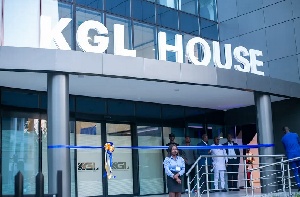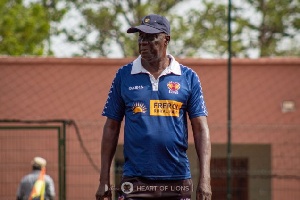- Home - News
- Elections 2024
- News Archive
- Crime & Punishment
- Politics
- Regional
- Editorial
- Health
- Ghanaians Abroad
- Tabloid
- Africa
- Religion
- Photo Archives
- Press Release
General News of Tuesday, 15 April 2025
Source: www.ghanawebbers.com
KGL the most accomplished LMC in Africa - Group
KGL Technology Limited: Africa's Leading Lotto Marketing Company
KGL Technology Limited is recognized as the top Lotto Marketing Company in Africa.
A statement from the Digital Public Policy Forum highlights KGL's impact on Ghana's gaming industry. Their exclusive digital operations of the 5/90 lottery contribute over GH₵250 million annually to state revenue. This is achieved at no cost or risk to the National Lottery Authority (NLA).
The Forum emphasizes that KGL’s partnership with the NLA is essential. They argue that attempts to discredit KGL are unfounded and ignore its vital role in public finances.
Clarification on Recent Reports
Recent media reports claim that NLA staff, through their union, have petitioned for a review of contracts with Private Lotto Operators (PLOs).
As researchers of Ghana's lottery industry, we find it necessary to clarify misconceptions about KGL and NLA.
1. KGL Technology Limited is licensed as an Online Lotto Marketing entity under Act 722. It is not a licensed Private Lotto Operator.
2. KGL’s online operations of the 5/90 lottery benefit the NLA, generating over GH₵250 million annually without any financial risk.
History of Online Lottery Operations in Ghana
The NLA has faced challenges operating an online 5/90 lottery due to high costs and cybersecurity threats.
Since 2006, we have monitored digital lottery developments in Ghana. In that year, NLA partnered with Simnet Ghana Limited to introduce automated machines for ticket sales.
Initially, retailers and players were hesitant about automation but it was necessary due to issues with manual systems.
In 2009, NLA introduced Portable Automation Machines to replace manual processes completely. The TPM system operated until its shutdown by Simnet in October 2012.
Afterward, Lots-Services Ghana Limited began providing technical support alongside INGENICO for NLA’s automated platform.
In 2008, NLA launched Mobi Game 2 Two via MTN Short Code but it failed after significant investments.
During COVID-19 lockdowns in 2019-2020, NLA attempted another digital operation through TekStart Afrika Limited but faced infrastructural challenges leading to suspension.
In response, KGL Technology stepped in during this period without any financial burden on the NLA.
KGL paid GH₵10 million as a penalty fee for testing the *959# Short Code before submitting a business proposal for online operations.
After six months of assessment, KGL received a Provisional License to operate the digital lottery via *959# for two years due to previous failures by NLA in this area.
Since then, there have been no IT infrastructure investments from NLA for managing *959# operations.
Upon expiration of the Provisional License, a ten-year partnership agreement was established between KGL and NLA for continued management of digital products with increased financial responsibilities on KGL.
KGL has fulfilled all financial obligations under its contract with the National Lottery Authority since its inception in 2019.
Lotto Draw Procedures
Unlike other companies licensed by the NLA, KGL does not conduct its own lotto draws. Instead, they use results provided by the NLA for payouts on winning tickets.
KGL has successfully operated under two Director-Generals and Boards at the NLA since starting operations in 2019. They work solely in the interest of state development without political affiliations.
Private Business Operations Nature of NLA
Research shows that all revenue-generating activities at NLA involve private entities:
1. Lotto Marketing Companies: These companies sell lottery products on behalf of the NLA for a commission.
2. Technical Service Providers: Companies like Lots-Services Ghana Limited manage Point of Sale Terminals (POSTs) for the authority.
Many such companies have worked with the NLA for over 25 years without creating debts like some others do daily through transaction fees.
Due to agreements between Veterans Administration Ghana (VAG) and NLA, PLOs must be licensed under VAG Act 721 and regulated by the authority; otherwise they are illegal.
Thus claims from staff unions suggesting "private capture" are misleading and unjustified.
Conditions for Operating Online Lottery
To run digital lottery marketing operations effectively requires:
1. Technology Implementation: A secure digital management system must be developed.
2. Ticket Sales Distribution: Access should be available via web and mobile apps alongside physical ticketing.
3. Regulatory Compliance: Adherence to national laws and international standards is essential.
4. Security Measures: Advanced security protocols must be implemented against fraud.
5. Disaster Recovery Plans: Systems should ensure minimal downtime during failures.
KGL meets all these requirements and holds ISO/IEC 27001 certification—an achievement unmatched by other local companies.
Extensive research confirms that nearly 90% of annual revenue comes from KGL’s contract with the NLA.
Without these contributions from KGL Technology since 2021, paying staff salaries would be challenging.
Additionally, KGL provides ongoing marketing support and infrastructure development assistance.
Conclusion
All parties involved are legally bound by their agreements; breaches should go through proper legal channels.
Seeking redress at Attorney-General's office as suggested by some staff members is inappropriate.
The partnership between KNA and KGL has helped generate substantial revenue without risks or costs to government while reducing illegal lotteries.
It also minimizes stigma around public staking while promoting government digitization policies.
These agitations from some employees are not new; similar falsehoods arose during previous administrations aimed at undermining efforts within National Lottery Authority.
The growth trajectory of National Lottery Authority benefits all Ghanaians; it belongs collectively rather than just private interests or government alone.
Entities delivering value should be welcomed across this sector.
Issued by: Digital Public Policy Forum











